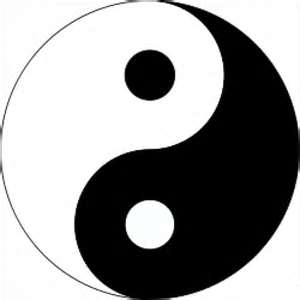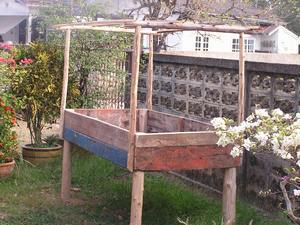This is an exploration of macrobiotic philosophy as I had been concerned about practice. I turned to Buddhism as a religion for peace, and have no doubts at all that the practice of meditation is important for controlling the aggressive egotism of miseducated minds - being a clear source of that which is not peaceful. Therefore understanding mind in macrobiotic philosophy was essential for me.
Is there a need for mental discipline, a need for discipline that is common amongst the type of Christian whose theoretical morality is strong but whose practice is weak? This type of Christian discipline is characterised by a lack of integration between body and mind, and I now characterise that as being a lack of using any mechanism for creating that integration. And the most obvious tool for such integration is meditation, although Nature can give you that integration if you truly live close to Nature.
So premised on this observation that there is a lack of integration I sought an understanding of this, and that understanding became clearer when Phiya Kushi, son of Michio Kushi, quoted his father thus:-
"First there is a "pre-mind" that is like an image which forms into our "spiritual" or invisible body. That is like the blue-print of our chakras and acupuncture meridians. This spiritual body is our mind but it is without "thoughts", as we would normally describe "thoughts" to be. This spiritual body then manifests itself through food and then becomes the real body and the real physical mind and brain then has thoughts, feelings, desires, beliefs and so on and makes each of us unique. Changing these relative thoughts and belief systems, without changing food and actions, cannot alter our destiny or make us healthier because these thoughts are themselves the result of the food we ate."
The spiritual body manifests itself through food. Whilst after birth the physical body develops through food is undoubtedly true, for me it is a big leap to then claim that thoughts, beliefs, desires follow from this. The physical body clearly functions within all these processes but to claim such a complete causal relationship is difficult for me.
Let me try to compare as macrobiotic philosophy and Eastern religions clearly have a similar root-base. But what is this pre-mind as related to the spiritual body? It is not too far away from Kamma. Kamma's blueprint is what keeps us in samsara, keeps us reincarnating. Within that Kammic blueprint is mind-body that reincarnates and improves depending on whether our intentions and then actions merit it. Is the intention to ingest particular foods such a powerful force that it is the same as this kamma? It appears too accidental, it could be but there is such a lack of intention that I have great doubt. Choosing to ingest certain foods could be a reflection of intention but it doesn't feel right.
There are clear counterpoints to this as there are so many examples in which mind controls matter. Consider the monks and the alms round. The monks carry their bowl, the people gratefully give food, gracefully received, and the monks consume. They are healthy often citing examples where through meditation they have overcome physical weakness, yet there is not conscious intention in their food, no diet that is followed. Whilst I am sure there are more examples that one is enough for me.
Whilst proper natural food can develop a healthy body, I cannot accept that the food then develops a healthy mind. This brings me to the mind-body continuum. This is essential to accept that food can direct - food precedes thought. But why is that precession only one-way? The thread on food and thought developed from a discussion on positive thinking, thought can impact on the body. There is so much evidence for this that it seems irrefutable that the process cannot be two-way.
"Changing our thoughts without changing food and action cannot alter our destiny or make us healthier because these thoughts are themselves the result of the food we ate."
I think there is strong evidence that improving the way we eat improves the state of our body and our minds become healthier and respond with a greater freedom. But it is then a jump to claim that thought cannot change without changing food. In my own case my thoughts were changed through meditation, and meditation in the end led to my changing food. Isn't this too much of a leap of faith?
"My understanding of the interface between belief and habit is that when we shift our thinking so that we are flowing with life in minimal resistance and great allowing, we naturally attract more health-sustaining activities."
I think this is more consistent with how I have described the mind-body continuum than the spiritual body manifesting through food.
I know little of  , but find it easy to accept that these are forces at play in our lives, these are forces at play inside and outside of our mind-body continuum. Understanding
, but find it easy to accept that these are forces at play in our lives, these are forces at play inside and outside of our mind-body continuum. Understanding  in terms of diet and personally does not require that the pre-mind and spiritual body is manifested through food.
in terms of diet and personally does not require that the pre-mind and spiritual body is manifested through food.
Macrobiotic philosophy is not good for the western mind, and understandably so when you consider that it is based in eastern religion. This in itself also presents a problem to me, what Eastern religion? Whilst I can fully accept that an Eastern religion would want to look after the body by eating naturally, to then extend that to the spiritual body being manifest through food does that have an origin in an established Eastern religion? I would be interested in a reference on this.
Why is it not good for the western mind? Because there is no inherent mental discipline, the mental discipline comes from eating healthy food. Now maybe the preparation, the detail, the understanding of  , all lead to a naturally healthy approach to life - and as such it is a Natural way, but what happens when people fall short? What is there to bring them back in line? Guilt. It is the same moral issue as western religion. If it is only that people should behave like this, then people don't do it. Religion has an extra tool as there is usually punishment attached to it - heaven-hell, and maybe the punishment of an unhealthy body is the macrobiotic guiding line, but it is just too tenuous.
, all lead to a naturally healthy approach to life - and as such it is a Natural way, but what happens when people fall short? What is there to bring them back in line? Guilt. It is the same moral issue as western religion. If it is only that people should behave like this, then people don't do it. Religion has an extra tool as there is usually punishment attached to it - heaven-hell, and maybe the punishment of an unhealthy body is the macrobiotic guiding line, but it is just too tenuous.
So what about meditation? Now clearly that can provide the mind-body integration and the Nature-mind-body connection but where does that fit into macrobiotic philosophy? There appears little emphasis on meditation as a practice although empty mind is a recognised state. (Clarified a bit in next blog entry.) Further meditation is better done on an empty stomach is something that I have certainly found - comparing morning and evening practice. Ascetics certainly believe that but I personally cannot draw a great correlation between empty stomach and mind.
It was asked "Could acupuncture, shiatsu, chakra work, etc. affect the blueprint
upon which it is patterned?" Chakras and meridians form part of the spirit body that is activated by the pre-mind and then manifests through food. That is new and more than helpful because I can recognise where that part of the body in the mind-body continuum comes from.
"At the level of the "pre-mind" or spiritual body there is a sense that everything is "one"; that "we" are all connected to each other and are one with the universe because, in actuality, it is that way." ….
"Ultimately our destiny is to return to infinity or the oneness. This is true for all us. To return to our "pre-mind" spirit and back to the oneness of infinity."
I note the two-stage process here - to return to "pre-mind" and then to the oneness of infinity. This is not inconsistent with Kammic consciousness and it could be that at the end of life we return to our Kamma whose blueprint has been altered for next time round - I don't know about this - need to study Kamma.
What I have difficulty with are the leaps of faith about food and its preceding of thought, and the lack of meditation to integrate Nature-mind-body. But there is a description of what mind ([*]) does that I need to consider:-
"Basically our mind (and I don't mean "pre-mind" here) does only two things: it divides and it puts things together. Another way of saying this is that it distinguishes things and it associates things. When we open our eyes for the first time as a newborn we see light, but then we start distinguish light and darkness; then various shades of lightness and darkness, and then colors and movements and so on. At this point we don't have words for them but we do see and can distinguish the differences. Likewise with sounds and all of the other things that come to us through our senses. As this point everything is new and we are just having a wonderful time experiencing all these new distinctions. But then we start to notice patterns and in noticing patterns, all we are doing is making associations with the things we saw or experienced before to things we experience in the moment. Furthermore we notice groups of patterns and so on. This in essence, is all our mind does and nothing more."
So this is the crux of the matter - definition of mind. Accordoing to macrobiotic philosophy is all that mind does associate and distinguish? (No, see [*]) What about intention? Creativity?
"we also chose to incarnate ourselves here and to enjoy the struggles of our life and living in our specific bodies on this earth and in that framework there are different levels of fates and destinies and free will. I have a certain amount of free will and can control my destiny up to a certain point. The earth and solar system has its own destiny and regardless of what I do whatever destiny it has is one that I must follow."
Here he discusses choice saying we have a limited amount of free will. It cannot be mind as mind is functioning through language - dividing and associating. It would imply that intention is part of the pre-mind, in my terms associated with Kamma consciousness.
That then just leaves intuition and insight. Phiya said that he didn't understand intuition but perhaps he wouldn't if it wasn't associated with meditation. He suggested innateness but wasn't confident.
This leaves a number of issues sorted:-
 A macrobiotic diet is a natural diet, and can only be praised and encouraged. Such a natural diet is based on local organically-grown produce without any form of additive etc.
A macrobiotic diet is a natural diet, and can only be praised and encouraged. Such a natural diet is based on local organically-grown produce without any form of additive etc.
 Macrobiotic philosophy describes human birth as having a pre-mind in a spirit body (of chakras and meridians) that through food develops mind with thoughts, feelings, desires, beliefs etc. The philosophy claims one infinity, and that humans return to that infinity. I don't accept this emphasis on food.
Macrobiotic philosophy describes human birth as having a pre-mind in a spirit body (of chakras and meridians) that through food develops mind with thoughts, feelings, desires, beliefs etc. The philosophy claims one infinity, and that humans return to that infinity. I don't accept this emphasis on food.
 Macrobiotic philosophy doesn't talk about meditation and sees the functioning of mind as a consequence of food intake. Again I cannot accept this because it allows for disordered mind - a lack of integration between mind and body (see [*]. On the same theme of meditation it does not incorporate insight understanding.
Macrobiotic philosophy doesn't talk about meditation and sees the functioning of mind as a consequence of food intake. Again I cannot accept this because it allows for disordered mind - a lack of integration between mind and body (see [*]. On the same theme of meditation it does not incorporate insight understanding.
[*] A response is discussed in the next blog-entry

